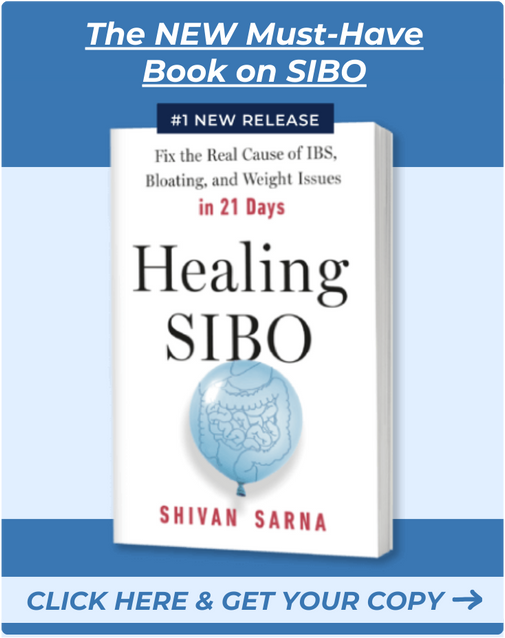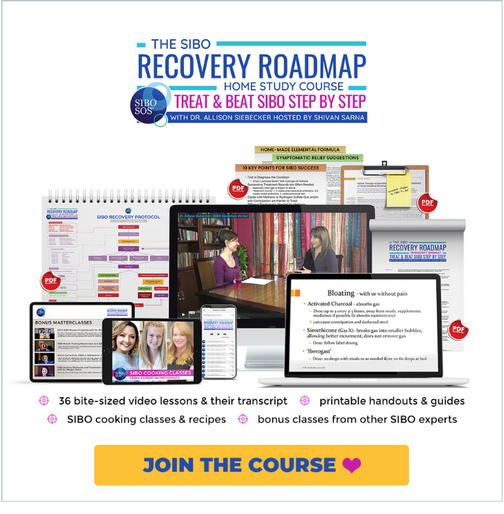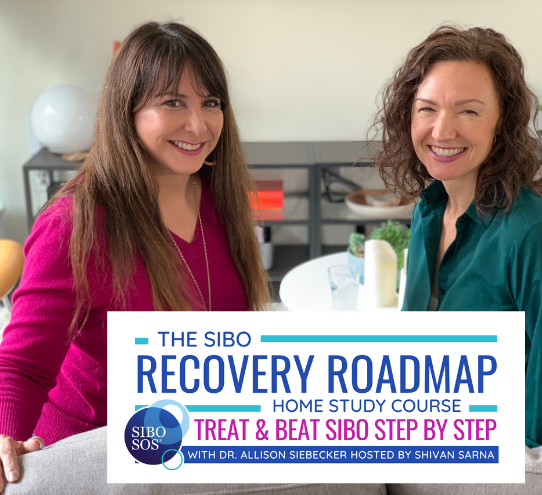Living with SIBO constipation is a complex battle, especially when it comes to managing this uncomfortable and often debilitating symptom.
(For me, I often fluctuate between constipation and diarrhea, which makes leaving the house really stressful. And then, the stress would perpetuate other symptoms… it became a vicious cycle!)
While SIBO itself is a condition characterized by an abnormal increase in the number of bacteria in the small intestine (sometimes caused by a trigger like an infection or food poisoning), its implications for gut motility and overall digestive health can significantly affect the quality of your life.
So how do you get constipated when you have SIBO?
SIBO constipation often results from the excessive bacteria’s interference with normal digestive processes – a phenomenon known as gut motility.
These bacteria not only consume the nutrients necessary for healthy bowel movements but also produce gasses that can slow down transit time, leading to hardened stools that are difficult to pass!
Moreover, the presence of these bacteria can cause inflammation of the intestinal lining, further complicating the passage of stools.
Understanding this connection is crucial for exploring effective relief strategies that address the root cause of SIBO constipation rather than merely alleviating symptoms.
Fast-Acting Relief for SIBO Constipation Symptoms
Fortunately, you have a handful of options for relief that you can start using immediately for fast-acting relief from SIBO constipation:
Potassium-Rich Foods
Potassium plays an important role in the fluid balance in your body and can help with constipation relief by regulating bowel movements. Foods like cucumbers, carrots, and avocados are not only rich in potassium but also fiber, which can help in softening stools and promoting regularity. Eating more of these potassium-rich foods into your diet may offer a natural way to alleviate SIBO constipation. However, it’s important to note that with SIBO, you should approach dietary changes cautiously, as some foods may exacerbate symptoms.
The long-term goal, however, is to address your root cause so that you don’t have to go the rest of your life with a really limited diet. But – we’ll get there!
Stool Softeners: Docusate Sodium & Docusate Calcium
Stool softeners, such as Docusate Sodium and Docusate Calcium, work by increasing water absorption in the stool, making it softer and easier to pass. While these medications can offer relief, potential disadvantages include dependence and reduced efficacy over time, so please consult a healthcare provider if this becomes a longer-term solution.
Enemas
Water enemas can provide immediate relief from constipation by adding fluid into your colon to stimulate bowel movement. Enemas can also reduce gas production by breaking down food properly and supporting digestion. While they are effective, the use of enemas in individuals with SIBO should be approached with caution. Overuse or even improper use can lead to disturbances in the natural flora of the gut and potentially worsen symptoms. They can be awkward and uncomfortable to perform, but they definitely can be useful in a pinch.
Glycerin Suppositories
Glycerin suppositories offer another method for helping to encourage bowel movements. Inserted rectally, they work by drawing water into the intestine, softening stools, and triggering the bowel to contract. However, continual use of glycerin suppositories may lead to the loss of regular bowel function.
So again, although these solutions are really effective if you need quick relief (I’ve been there!), potential side effects and the risk of dependency make professional guidance crucial. Consult with a healthcare professional to determine the appropriateness of these medications for your specific situation.
Personalized Consultation and Professional Guidance
And if you don’t know where to turn for that advice, we can help!
Because SIBO is so complex and has a strong impact on your digestive health, no over-the-counter medications or fancy juice can replace the benefits of personalized consultation.
Tailoring treatments to individual needs can significantly enhance the effectiveness of constipation relief strategies, supporting both safety and efficacy.
This is why we created The SIBO Recovery Roadmap® Course where our goal is to provide you with a step-by-step plan and not a one-size-fits-all approach! What you need is a plan that can work for anyone, even tough cases.
When you enroll in this course, you will get access to 4 Live Small Group Coaching Sessions with me and Dr. Allison Siebecker. We will answer all your questions and you will get to interact with a community that has the same SIBO story as yours. You will also have access to SIBO Recovery Roadmap® Course, which is a huge bank of video recordings and transcripts that will guide you throughout this journey.
Ready to take the next step? Enroll here.
In the battle against SIBO and constipation, knowledge, and understanding are your most powerful tools. With the right approach and professional support, finding relief and improving your quality of life is never impossible.












2 thoughts on “Quick SIBO Constipation Solutions to Relieve Your Worst Symptom”
What remedies help with pain in lower gut region besides, ginger tea, heating pad? I’m wondering if berberine can help with that? Just waiting for prescription to be preauthorized for xifaxan..
My issue is with gut motility, sibo, and ibs pain and my question is when do you start
with motility activator? Should that be after you’ve completed the xifaxan/neomycin?